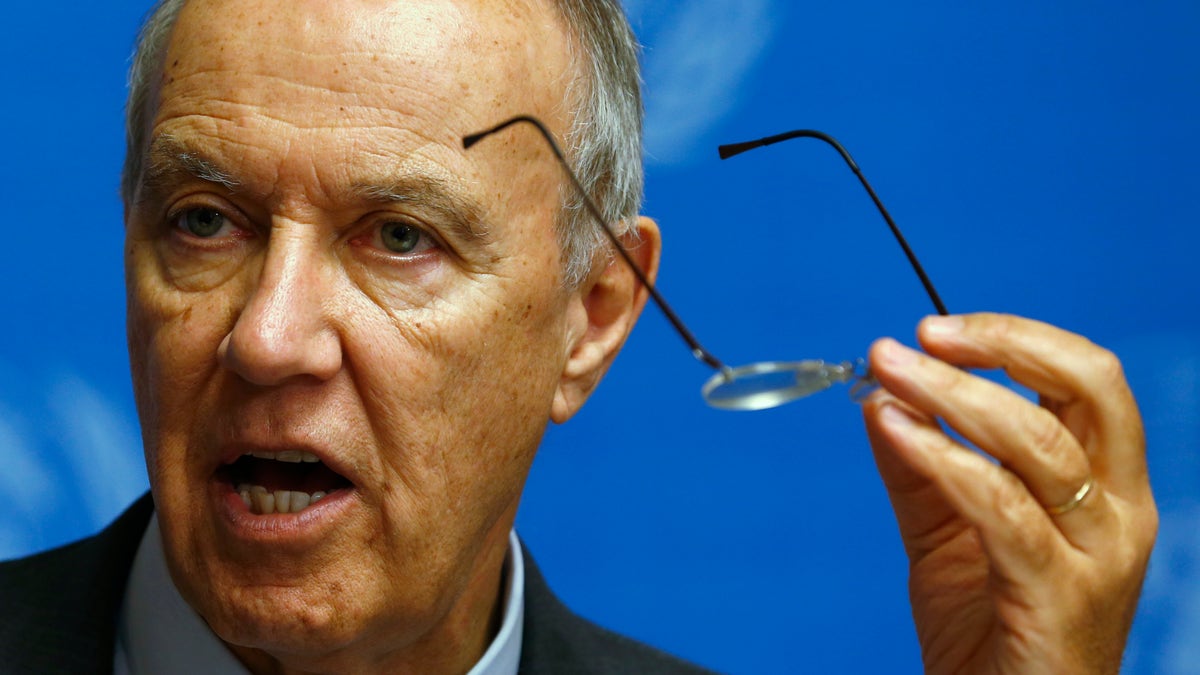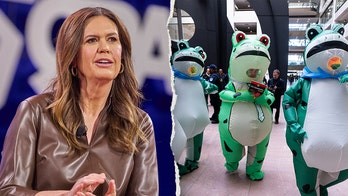
December 9, 2013: Director-General of World Intellectual Property Organization (WIPO) Francis Gurry addresses a news conference at the United Nations European headquarters in Geneva. (Reuters)
EXCLUSIVE: The only United Nations agency ever sanctioned by the U.S. State Department for failing to protect whistle-blowers has just done it again—and left the Obama Administration outmaneuvered and outfoxed in the process, at least so far.
In a bid to recover ground, U.S. diplomats, along with those from other nations that ostensibly oversee the World Intellectual Property Organization (WIPO), an obscure but important U.N. agency in Geneva, were negotiating furiously to see if they will ever get to read a report on alleged wrongdoing by the agency’s autocratic director general, Francis Gurry, accused among other things of ordering illegal break-ins of his own staffers’ offices.
Gurry himself already has a copy of the full and unredacted report on his own misdeeds-- including the names of witnesses who testified against him—in violation not only of whistleblower protection rules but of standard U.N. investigative practices used to ensure witness cooperation.
According to a State Department spokesman, U.S. diplomats in Geneva were still demanding “immediate release” of the report—which WIPO’s 188 member states had ordered up themselves from the U.N.’s Office of Internal Oversight Services, and which was delivered to the chair of WIPO’s General Assembly in February.
So far, the WIPO Chair—a Colombian diplomat named Gabriel Duque—has refused to hand over the document to his own membership. But he did give a copy to Gurry, an action that a U.S. State Department official told Fox News “falls far short of standard practices” for handling such sensitive documents.
Ever since, U.S. and other concerned WIPO members have been scrambling, without much success, to catch up, while giving up negotiating ground in the process. On May 19, the concerned countries wrote a letter to Duque, demanding copies of the sensitive report.
On May 26, the U.S. Ambassador to the U.N. in Geneva, Pamela Hamamoto, joined other diplomats in meeting with Duque—who supposedly acts on behalf of all of them—to demand “immediate access” to the full report, in the words of a State Department official.
But the U.S. offered a concession in the meeting: according to a State Department official, the U.S. would accept “reading room access” to the document—meaning that it would not get a copy of the document, only the right to read it.
In other words, the man who was never supposed to get a full copy of the investigation report would keep it, but the countries that commissioned the effort wouldn’t be able to do so, while the witnesses in the sensitive report, as well as their testimony, are now known to their boss.
At week’s end, Duque had apparently not offered a reply to the countries demanding access to the document .
Questions from Fox News to Duque and to Gurry himself about the disposition of the report had received no reply or acknowledgement before this article was published.
“It's past time for all this craziness to stop,” declared James Pooley, a U.S. patent attorney and former top WIPO official who launched a formal complaint against Gurry last year, which led to the WIPO director general’s investigation.
“WIPO is an agency owned by the Member States who created it,” Pooley added in a statement to Fox News. “They are Mr. Gurry's employer, entitled to know the facts of his behavior so that they can make an informed decision about what to do. For the sake of the witnesses, of the decent and dedicated WIPO staff, and of WIPO's integrity as an institution, the Member States need to act now to regain control.”
The fact is, however, that Gurry’s ability to surprise, outmaneuver and stonewall WIPO’s supposed nation-state owners over the past several years has provided numerous examples of the profound lack of control exercised by countries over supposedly subordinate U.N. institutions—and the ability of U.N. bureaucrats to make up their own rules and methods of behavior.
WIPO, an agency that manages the world’s treasure trove of patents, is unique among U.N. bodies, not only for its mission, but for the fact that it makes money through registration fees rather than through donations from member states—a key factor in Gurry’s ability to flout its membership. In 2014-2015 fully 94 percent of WIPO’s budget came from its own revenues.
In 2012, a Fox News investigation disclosed that Gurry had ordered the secretive shipment of sensitive computers and other equipment to North Korea and Iran, even though both countries were under U.N. sanctions for illegal nuclear weapons program.
A subsequent investigation ruled there were no express sanctions forbidding his action, though the probers also declared themselves flabbergasted that Gurry had not informed member states of his actions. No long afterward, Gurry suddenly decided to open WIPO offices in Russia and China without letting other member states know about the decision.
The actions that initially spawned the latest investigation fiasco took place in 2008, before Gurry held the top WIPO job, when he allegedly offered the office break-ins to seek DNA evidence that some his staffers had written anonymous letters against him.
Swiss legal authorities cleared the staffers of any involvement—but they discovered the illegal evidence used in the investigation in technical reports of the DNA samples. The issue festered internally to WIPO until Pooley made his formal complaint, because internal WIPO investigators all reported to Gurry. Eventually, WIPO member states turned to the U.N. Secretariat in New York to get an independent investigation going.
Gurry’s high-handedness and ferocious reaction to internal criticism, however, have for years made WIPO notorious among organizations that protect whistleblowers.
Last year, that led to State Department sanctions under a new law that sought to guarantee U.N. adherence to transparency and whistleblower protection. The State Department penalties amounted to 15 percent of U.S. government support for the agency--a piddling $375,000.
According to a State Department spokesman, the U.S. is still “deeply committed to advancing accountability, integrity, and transparency reforms throughout the U.N. system,” and “has worked to strengthen protections against whistleblower retaliation…to assure that whistleblowers can report wrongdoing without fear of reprisal.”
The shenanigans at WIPO don’t do much to support that assertion.
Indeed, if anything, they have so far undermined not only the State Department’s whistleblower efforts, but also the entire U.N. investigative process.
George Russell is editor-at-large of Fox News and can be found on Twitter: @GeorgeRussell or on Facebook.com/George Russell












































